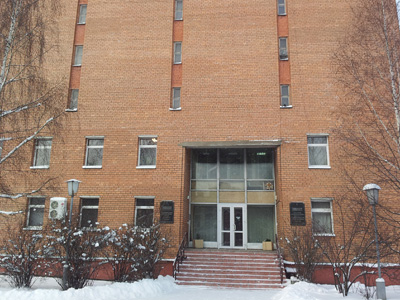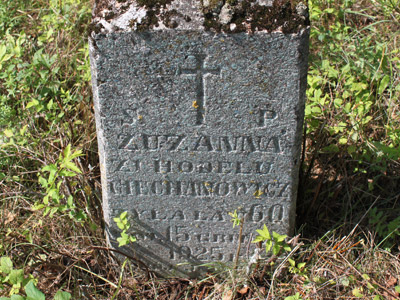Belarus genealogy tours
Special guided Minsk tours aimed at the field Belarus family research.Belarus family tree research
Belarus family research budget
In Belarus as well as in other neighbor countries it is now a common trend to create one’s own family genealogical tree. Most people remember 2-4 generations of their ancestors. However, the more one is asking about his great grandfathers, the more interesting it is to know where one’s roots are.
(Before you start reading, please keep in mind: you never try - you never get and I can help where I can on this end in Minsk...)
Where to search?

National Historic Archive of Belarus, Minsk, 2012
If you don’t want to dig deep, the funds of the State Archive will probably be enough – its branches are located in all regional centers of Belarus. The documents as old as 1917 are stored there and if you want to learn more about your grandfathers and grandmothers it is most likely that you will find detailed information there. But if you want to track your ancestors who lived in 17-19 centuries, you should pay a visit to the National Historic Archive of Belarus where papers issued before 1917 are stored (papers dated after 1917 can be found in the National Archive).
The latter archive also contains documents that date back to the times when Belarus was a part of the Grand Duchy of Lithuania, Rzecz Pospolita and the Russian Empire (late 14 – early 20 centuries). Some trips will have to be made – the papers from Grodno Province and those issued in Vilno, Disna, Lida and Oshmyany areas of Vilno Province of the Russian Empire from 1802-1917 are stored in Grodno State Archive. You search might lead you there.
Please, bear in mind that the state archives are state-run folks and unlike some tour guides they don't work 24/7 so allow a week for their reply (they accept requests in English, but if reply comes in Russian - drop it to me - I will translate for free). The archive policy - check your own ancestry, commercial requests are only handled by the archives / trusted researchers.
Create your family tree. Time and money – which is more expensive?
You can try to build a genealogical tree on your own or address professionals from this field. If you have a lot of time to spare and you would like to track your ancestors on your own, you have every chance to touch the history. You need to submit an application to the State Historic Archive and pay the admittance fee – you will be allowed to visit the reading hall of the Archive and use the documents once a week within a year. Initially it will be hard, but later you will sharpen your skills.
But again: to create a genealogical tree you will have to spend a load of time and browse through hundreds of documents. Some difficulties might occur here – some papers might be in Polish and some families, e.g. as in Eastern Belarus were registered without surnames.
The second option will save your time but is rather costly. Your Belarus family tree can be created by the staff of the archive. Today over 10 applications are submitted to the archive per month which causes a delay of six months. Currently there are 5-6 specialists doing the genealogy research and sometimes specialists from other departments are assigned to this work. Update: a search for one person costs US30, about 15 is payable in advance, the rest - when concrete results come up. Of course, Paypal is not in their vocabulary. Quite damaging to US customers whose bank commission will exceed the payment itself. Please, contact me if you need to pay for the archives from here in Minsk.
You will have to start on your own anyway

A tombstone in Naliboki cemetery. Sometimes these are the only witnesses of the past.
To enable the archive staff to take over your family research you will have to help them – give a starting point. The more detailed information you will provide on your family, the more chances there are to create a family tree, rather than just a branch.
You must submit data on the relatives that dates back before 1917 to the National Archive – anything you can recall for sure. This might include names and surnames, different documents and most importantly – areas of residence of your relatives. If you have no such information, your application will most likely be rejected.
When building your family tree, the archive staff will only use the papers stored in the archive. Which means that if you want to get some information from abroad you will have to address the archives of the respective foreign countries. Besides, the archive search is carried out by one surname and if you want to find your mother’s and father’s relatives, you will have to pay for two separate genealogical research applications.
Belarusian Gentry and the skeletons in the cupboard
If your family originates from peasants, the family history can be traced till the 1750-1795s (in 1795 the census of the population of the new territories added to the Russian Empire took place after the division of Rech Pospolitaya). If the ancestors belonged to gentry, its history can be traced to 16-17 centuries.
By the way, if you are tracing your family roots in Belarus it is very likely that your great grandfathers were noble – while in Russia gentry made up less than 2 per cent of the total population, in Rech Pospolitaya it amounted to 10 per cent. Almost every third Belarusian has noble origins. It was only after 1917 that our ancestors became all peasants and workers. (A customer of mine from Texas managed to trace his ancestry to the nobelmen of the 18th century - I simply translated the archive replies for him. A)
Many people want to know more about their ancestors out of purely pragmatic interests. Noble titles have nothing to do with it because they will not earn one a free ride in public transport. Those who will manage to find any Polish family roots will be able to use them as benefits when entering a university in Poland. Some people want to find Jewish roots and get very upset when there turn out to be none. It sometimes comes to anecdotes when people learn about shady dealings of their ancestors and refuse to collect the family tree from the archive. But one cannot erase one’s history at will – hence cupboard skeletons…
One million for the history (don't fear millions - Belarusian exchange rate is funny)
The price for a family tree is based on the amount of time it takes to create it and might reach up to USD 450 (note! these were 2012 prices). First you will have to make a prepayment of USD 149 and pay the rest after the research is complete. In case the roots of your ancestors in Belarus were not found, the prepayment is retained since a research had been carried out. (Per person requests are considerably cheaper).
You will be able to get the Family book or even an artistic genealogical tree where your ancestors are depicted in the roots and their descendents – in the branches. The National Archive of Belarus hands out certificates listing all the relatives and the names of documents that prove your relationship. The creation of a family tree is a job of an artist and you will get down to it after your Belarus genealogy research is over.
I am not an archive specialist and therefore my assistance in your Belarus genealogy research might be limited to the free Russian-to-English translations of their replies and fixing the archive payment on your behalf. I could also visit a particular place – a remote village or a cemetery to look for a name or to talk to knowledgeable old people. Who knows – it might produce some fruitful results on which your further trip to Belarus can be based. I run a private project to index historic Belarusian cemeteries.
Passing a village by I can chat to your relatives or friends or make a polite inquiry. Minsk city address book for 1911 is available for a free look-up of surnames and addresses. Memory books for Grodno, Minsk, Vitebsk and Mogilev gubernia for 1860s-1917 are at my disposal - if your ancestor was a landowner or held an important job in these cities he is likely to be listed in one of those books (the search is manual).
Discover your ancestral grounds with Minsk Guide :)
Ancestral trip to Belarus - guests from Israel share impressions
|
|
Featured
Applying at their local Belarus Consulate, the citizens of migration-secure states (e.g. the USA, Canada, Japan and others) can obtain a short-term...
The form of application for a visa to Belarus has become digital and you can save and send it as a PDF file. It is only a 2-page document that is available...
Quite a number of things, as a matter of fact. Let’s examine a typical case from my travel agent’s past with a traveler landing in Minsk Airport (MSQ) and applying for a visa...
People, who want to travel to Belarus to see a friend, take care of the grave of a relative, take part in the court hearings, etc. need to apply for a private visa...
This article covers field family research in Belarus that in most cases comes after dealing with the State archives of Belarus and genealogical research.
A plastic card is a fine thing, no doubt, but there have been a number of cases when the ATM displayed ERROR, or required a PIN code...
While most tourists agree that Belarus is not the country for grand shopping, there are still some things that can be brought back as souvenirs...
